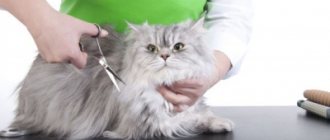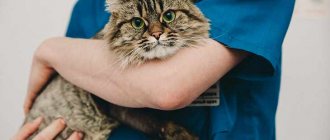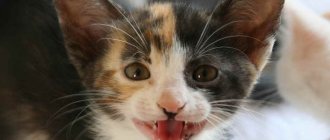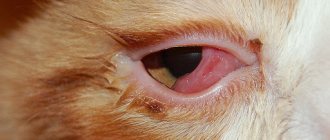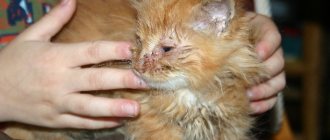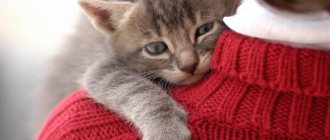Animals experience stress just like people, and often to a greater extent. The environment, unexplained events, and a banal move can have a detrimental effect on the pet, as they are difficult to withstand nervous overload.
Stress in a cat, like stress in a cat, is not always noticeable, since these animals are able to suppress their emotional state and not show off their fears and worries with dignity. Therefore, the owner’s task is to know the behavior of his pet down to the smallest detail in order to notice oddities in behavior in time and provide support and the necessary assistance.
Stress in cats: symptoms and consequences
Stress is a reaction to changes in the external environment of a pet. This reaction occurs due to overstrain of the nervous system, subsequently changing the physical, psycho-emotional and behavioral state.
Kitty
There are two known types of this disorder in pets: long-term (chronic) stress and short-term (acute). Short-term stress usually passes unnoticed and does not carry any consequences, but long-term stress is similar to human protracted depression; it affects the pet by negatively affecting the entire animal’s body.
Cat
Acute stress is identified by the following symptoms through simple observation:
- involuntary salivation;
- the ears are pressed back to the head;
- the eyes are wide open and the pupils are dilated;
- the tail is pressed to the body, the paws are bent;
- frozen state, immobility;
- plaintive moans, meows, howls, roars, hisses;
- aggression towards others;
- mustache directed backwards;
- shaking or swaying from side to side.
For your information! Chronic stress is more difficult to define, since it often develops into long-term stress without being noticed. Signs of it can be detected when the pet’s health condition deteriorates significantly.
Signs of chronic stress:
- eating one's own fur;
- lack of desire to ensure personal hygiene;
- increased excitability, panic reaction or fear to minor noises;
- defecation and urination near the tray;
- long rest, feigning sleep;
- increased appetite or its complete absence;
- gaming activity is reduced;
- vague dual behavior (stand up, lie down, sit down, jump happening at the same time, signals that contradict themselves);
- isolation, desire to hide.
Aggression in a cat
It is not difficult to notice symptoms of stress in a cat if you pay close attention to the animal:
- reduced immunity (easily susceptible to bacterial diseases and viruses);
- increased sensitivity to stress (the cardiovascular, digestive and urinary systems suffer);
- skin inflammatory process (eczema, dermatitis) appears;
- high blood pressure;
- blood sugar becomes higher than normal;
- rapid, sometimes intermittent breathing.
The symptoms of stress in a cat are similar to those of cats, the only difference is in behavior: some cats become aggressors after castration when stressed.
Important! The more stressed a pet is, the shorter its life expectancy will be. It is very important to notice and prevent the occurrence of this disorder in the early stages.
The danger of stress
The life of a domestic cat is closely connected with the actions of its owner. However, this does not mean that the animal likes everything. Sometimes people are forced to expose their pets to any stress factors.
It is impossible to explain to a cat that she just needs a bath, a haircut or a trip to the vet, that people move or die, and sometimes just betray their friends. Pets become attached to both people and places of residence, they worry, experience emotions, and their range is almost as wide as that of a person.
The nervous system reacts instantly to circumstances that are negative from the animal’s point of view. Acute stress is characterized by the following physiological manifestations:
- pulse and heart rate increase;
- breathing becomes faster and shallower;
- pressure rises.
Such symptoms, just like in humans, are associated with a sharp release of stress hormones. The nervous system is able to cope with an acute condition, but with prolonged exposure to negative factors, the pet can fall into a chronic depressed state. The animal's cardiovascular system changes, digestive processes are disrupted, and immune defense is reduced. That is, emotional problems are reflected in the functioning of the body.
Why are some cats more likely to develop stress?
After sterilization, the cat asks the cat: is this normal and what to do?
The tendency to cope with stress is deeply dependent on environmental and genetic facts. While still a small kitten begins to explore the world, and if during early development it was deprived of this opportunity, then with any change in the situation it will be subjected to stress.
Cat
If during pregnancy a cat experiences emotional turmoil and does not eat enough, then the kitten is born obviously not stress-resistant with a certain inadequate reaction to stressful situations.
Note! Constantly being in a cage or locked up also complicates the life of a pet; after such imprisonment, it is almost impossible to bring a cat out of a state of depression.
Feed release form
Stress in 60% of cases causes the development of idiopathic cystitis in cats, which, in turn, causes urological diseases. “Hill's Urinari” is a specialized food for cats, which, thanks to its unique composition, reduces stress and the likelihood of developing idiopathic cystitis.
Currently, there are no analogues to such food that can be purchased and used without a doctor’s prescription. “Hills Urinari” helps a cat quickly adapt to a new home, environment, children, people and other animals. The food is also recommended for reducing stress during frequent exhibitions and eating low-quality foods.
We invite you to read: Does your cat not love you? Let's figure out why she behaves this way
Hills Urinari food is produced both in dry form and in canned form. The packaging contains the composition, content of vitamins, minerals, as well as the dosage for mixed (natural food, dry and wet food) and constant feeding of dry and wet food.
Produced by Hills Urinari in France.
Causes of stress
A cat was bitten by a snake: what to do, symptoms
Cats that live in special love, care and attention are less likely to be stressed. They are also distinguished by their particular stability and balance, but any irritating external factors can lead the pet into a slight panic.
External circumstances:
- the appearance of other pets in the house. At this moment, the cat is controlled by jealousy. Reluctance to accept a new member of the household can last for years and develop into long-term depression;
- stress is inevitable if the pet’s daily routine has been extremely disrupted. Food delivered at the wrong time or a delay at work can frighten your pet and make you feel anxious;
- The veterinary clinic is the key reason for all animal fears. Going outside, strange smells, people - all this can lead to stress, and subsequently to extensive hair loss;
- cats, like people, need fresh air; when oxygen is deprived, the animal experiences stress;
- repair. Noises, smells, bustle, dirt, strange people - all this uncertain environment can provoke cat fear or acute stress.
Stress after moving
Moving is also an external circumstance and the most terrible event in a cat’s life. In a new living space, the cat tries to move carefully, constantly stopping at minor rustles. Hide and seek becomes commonplace in this stressful situation.
Note! When moving, it is best to keep your pet close to you and, if possible, pick it up more often. In a new room, you need to walk through the rooms and do a few actions so that your pet feels safe in the new place. And in the near future, avoid sudden overloads (trips to the veterinarian, trips to visit). You can give the drug stop stress or cat-bayun for a more painless adaptation.
Moving with a cat
Fright
During and after a fright, the animal may experience stress. Fright can be caused not only by a long absence of the owner, but also by a banal loud sound or a sudden drop of an object on the pet. If after this the animal experiences tremors, it is necessary to relieve the tension with medication.
Noisy places are scary
If a pet has lived in an apartment all its life and has no idea about the street or moving to public places, then any experiment with travel can result in prolonged chronic depression.
Diseases and physiological causes
It's not just humans who experience illness or physical pain that can cause stress. Animals react more sharply to these factors due to their vulnerability and sometimes insecurity. One of the most important points that owners do not often pay attention to is parasites.
- Worms disrupt metabolism, lead to intoxication and lead to vitamin deficiency in the animal's body.
- Fleas are external parasites that cause itching and burning, leading the animal to stress and sometimes to aggression. Promote the development of dermatitis.
- Ear and scabies mites provoke persistent subcutaneous itching and also have an acute effect on the psyche.
- Lice eaters disrupt thermoregulation, leading to itching and deep skin pain.
- A number of fungi that affect the animal’s skin and mucous membrane are accompanied by itching or irritation in the tissues.
Signs
Symptoms of stress manifest themselves in different ways. Sometimes they can be weakly expressed, and an inattentive owner will not pay any attention:
- lack of appetite or excessive gluttony;
- perverted taste preferences (eating plants, soil, clothes);
- decreased temperature, blood pressure and muscle tone;
- excitability or apathy;
- lethargy or aggression for no reason;
- ignoring communication with the owner;
- craving for cleanliness, which is expressed in constant licking of fur, which leads to the formation of bald patches and skin irritation;
- neglect of self-care, which causes the coat to become dull, matted and dirty;
- frequent yawning;
- diarrhea.
It is important to monitor your pet in order to notice signs of stress in time and take timely measures to provide assistance.
If a cat exhibits symptoms indicating a stressful condition, it is first necessary to eliminate the causes. But it happens that this is impossible to do. For example, after moving, it is impossible to return to the familiar environment and atmosphere. You can try to distract the animal: pick it up, stroke it, warm it, talk in a calm voice. Sometimes playing with familiar toys and short walks (if they have been done before) help.
How to Treat Stress in Cats
You can find out how to relieve or treat stress in a cat from a veterinarian after undergoing an examination for chronic and severe diseases. If the pet is healthy, then drug therapy is used.
Drug therapy
Ethylene glycol vitamins are prescribed to reduce anxiety or the drug clomipramine to reduce anxiety. Diazepam is sometimes prescribed, but when it is used, excessive excitability sometimes occurs.
- Aromatherapy is a relaxing lavender oil that has a beneficial effect on the well-being of others. It is best to light incense sticks while ventilating, so the smell will be light and unobtrusive.
- Herbal medicine - a couple of drops of valerian will quickly calm an irritated animal.
- Bach flowers have the ability to restore balance between the body and brain, eliminating negative emotions, fear, anxiety and hatred of others.
Medicinal treatment of cats
Behavioral therapy
The owner must understand some rules in communicating with the animal.
- Touching. Tactile touches have a beneficial effect on the body when an animal is stressed; just massage your pet’s head with your fingers in a circular motion.
- Massage. Daily intake will have a beneficial effect on the mental state of the pet. Often, when massaged, cats fall into a trance and fall asleep.
- If your pet loves to play, then you should provide him with his favorite types of toys and spend more active time with him.
What can the owner do
If you notice signs of stress in your cat, then you need to eliminate its causes. After this, the animal should return to normal. During this time, you should pay more attention to him.
The task of a cat owner who is under stress is to switch his attention and distract him from the stress factor. Offer new toys and entertainment, give tasty food.
Physical activity helps with stress. The best option is to purchase a play complex where the cat can climb, jump, and play with all sorts of devices. Consider the age and health of your pet. Physical activity must be adequate. The cat’s nervous system does not need overload to avoid an emotional breakdown.
You can relieve stress in a cat using the immersion method - simulate situations that irritate the animal. The goal is to teach him that there is nothing dangerous in them. For example, if a cat is panicking on the street, take it outside in a carrier, gradually increasing the walking time.
A stressed pet will be relaxed by the owner's attention. Pet him and massage him often. It will be useful for you too. A good method of relaxation is a pleasant smell. Aromatherapy calms animals, whose sense of smell is much better than ours. Use an aroma lamp or special incense sticks. Choose the scent of lavender, mint, cedar, bergamot. They give a sedative effect.
Try different methods of getting rid of stress, taking into account the reasons that caused it. A combination of several methods may be required. You will understand what is right for your cat only through practice.
Adjust your animal's diet when stressed. Sea fish, vegetable oil, eggs, and fish oil will be beneficial for the nervous system. Choose ready-made food containing fatty acids.
Preventing stress
A few rules to protect your pet from unnecessary stress:
- You should have your own cozy corner, personal space, preferably away from prying eyes;
- It is not permissible to play with an animal against its will (this is usually what children do);
- Praise is the best way to cheer up your pet;
- there must be constant access to the window;
- active games are the best prevention.
Cat and cat
When purchasing a pet, you should carefully approach its care and care, because responsibility for its life lies with the owner. Only a close person is able to understand his psychological or physical state in time and provide assistance as needed. Affection, care and attention are what a pet expects from a person.
What medications will help the cat?
If home measures do not have an effect, then a veterinarian will relieve stress. Do not self-medicate and give your cat only medications prescribed by a specialist in the indicated dosages. Medicines based on natural herbal extracts are safe for your pet. They are given to relieve stress and preventively, so that a stressful situation for the animal does not overwhelm it.
In some situations, pheromones prescribed by veterinarians help cats adapt. The walls and furniture in the house will have the smell that the cat's glands secrete. It is very useful to use a synthetic analogue of this smell when moving, treating the premises in the new house with it. The animal senses that there is no reason to worry, its emotional state stabilizes.
Pay close attention to your cat for signs of stress. Timely, competent assistance, including veterinary assistance, will alleviate the animal’s condition.
Authors of the articles: Belanta Clinic team



